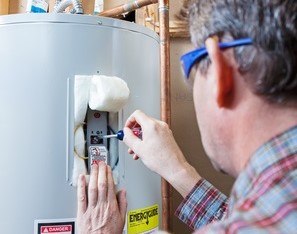
Cracking the Code on Home Water Heater Sizes
Navigating the ins and outs of home improvement can be about as straightforward as a maze in a sandstorm. The realm of water heater sizing lies in the heart of this complexity. Your water heater is important for warm showers and clean dishes. Accordingly it should be the right size to meet your energy needs and keep you comfortable.
How do you know what size water heater you need? This daunting question plagues many homeowners venturing into the realm of upgraded water heating. It’s not merely about what’s available, rather, it’s a tailored decision designed to enhance your unique abode.
The Perfect Fit: Understanding Water Heater Sizing
The size of your water heater is directly correlated with the comfort it can offer in terms of hot water production and energy efficiency. First its important to start by identifying the hot water demands of your household. A metric that consists of multiple factors, not just your family size. The type of showerhead, how often you use hot water, the temperature of incoming water, and your home layout all matter.
The Variables You Can’t Brush Off
Your geographical location plays a pivotal role. Basically if you’re near the equator, chances are you already have lukewarm water coming in, which means your water heater has less work to do than those in colder climates. Then there’s the matter of those seemingly innocent showers – their length and the flow rate can turn the heat up or down on your water heater needs.
Unveiling the Family Sizing Formula
A simple family size to gallon capacity conversion equals approximately 30 to 40 gallons for a family of two. This is according to the Water Heater Association (WA). A specialized family, particularly one that hosts long and lasting family showers or runs through multiple loads of laundry in one day, would warrant a larger tank.
- Factoring in Energy Efficiency: It’s not just about heat volume; it’s about how efficiently you can produce it. The Energy Factor (EF) rating determines this – a higher EF means a more energy-efficient unit, which can often mean you can afford to downsize without sacrificing warmth or pressure.
- Anticipating Your Hot Water Needs: Your water heater is like a silent, watery butler – constantly on standby and ready to serve. But it can’t predict the future, which is where your skills as a clairvoyant come in handy.
- The Peak Hour Demand Knowing Your Schedule: Consider your family’s usual hot water schedule. The one to two hours that typically have the highest concurrent usage – say, mornings – represent your peak hour demand.
Accordingly your water heater should be sized to meet this peak usage. Ensuring everyone has hot water when they need it most.
Future-Proofing or Warped Wishing?
Anticipating major changes in your household is akin to peering into a crystal ball. Are you downsizing in the future, or maybe upsizing? Life can be as unpredictable as water heater sizes. Choosing a slightly larger model can future-proof your decision, ready for whatever twists and turns life might throw your way.
Evaluating the Space Constraints
While it would be lovely to have a water heater the size of a hot tub , space constraints are the harsh reality.
Measure Twice, Shop Once
A robust water heater without a home is like a fish out of water, and that’s no overflow of fish tales. Twinning your chosen gallon capacity with the size dimensions of your available space is a marriage made in utility heaven. Measure your installation spot meticulously, considering not just the height and width but the depth for a snug fit.
Efficient vs. Space-Saving Designs
Modern water heaters come in all shapes and sizes, with innovative designs to optimize not just capacity but also space. Low-profile and tankless options are becoming increasingly popular for their space-saving properties, providing a bespoke solution for even the most unique homes.
Balancing Act
Bigger water heaters cost more upfront, and their efficiency can be affected if the water isn’t used to capacity. Opting for just the right size means you’re not just saving on the initial cost but also on your monthly utility bills.
Factoring in Installation and Maintenance
The cost of installation and maintenance should be factored into your decision. Prices can vary depending on your location and the type of water heater.
Size matters, but not only in the cubic capacity of your tank. It’s the perfectly aligned water heater dimensions that speak to your unique household needs, ensuring utmost satisfaction and operational efficiency. Remember, when it comes to your water heater, it’s not just about choosing big or small – it’s about choosing smart, efficient, and suited to your lifestyle.
